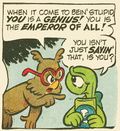Trudy, my student and friend from ten years ago, has grown from a Hong Kong pianist into a New York publisher/performer/gourmet chef, and friend to many people across several artistic communities. Her husband Frank, whom I met for the first time a few weeks ago, is a composer/journalist/intellectual – one who can connect to a vast number of styles and works, who knows people and pieces and performers and histories, and is constantly cross-connecting them to each other.
While Trudy was making magic in their kitchen, Frank and I wandered around their apartment (which is in an eerily well-preserved Art Deco building way uptown). It's an apartment that actually contains more books and records than mine does – we traded cheerfully boastful tales of how many obscure and complex and brilliant things we could pull out of various shelves. (It is faintly possible that other, more normal, people might find this tedious; but we don't care about them of course – we share the collector's mania, which seems Completely Sane to those under its spell.)
Among the rapid-fire discussion and excellent food, I grabbed an opportunity to bask in telling the tale of My Last Composition (Frank is cheerfully encouraging to artistic vanity – a valuable quality in someone who spends so much time with artists of all kinds). And I said that it was, truly, my last work – that 1987 was the end of a lot of things for me: and that writing those last miniatures, just before I finally took the HIV test, was putting something to rest that couldn't possibly continue.
 Frank is, however, devoted to creativity, especially in music and composition, as he said in his blog entry.(An incredibly complimentary blog entry, by the way: I am torn between pride (Look, a New York composer/critic said I was cool!) and embarrassment (of the kind exhibited by Churchy in Pogo – I can't find the picture I'm thinking of, where he gets simultaneously embarrassed and excited by praise, but here is an example of Churchy's style)).
Frank is, however, devoted to creativity, especially in music and composition, as he said in his blog entry.(An incredibly complimentary blog entry, by the way: I am torn between pride (Look, a New York composer/critic said I was cool!) and embarrassment (of the kind exhibited by Churchy in Pogo – I can't find the picture I'm thinking of, where he gets simultaneously embarrassed and excited by praise, but here is an example of Churchy's style)).
But I disagree with Frank. Yes, all right: creative practice, composition, music – all are certainly admirable things; and I'm glad to say that my last composition did show some honest craft and self-expression. In fact I'm frankly proud of it – when we clean up the recording my students made a couple of months ago, I'll put it up in this blog, together with a pdf of the score, and the story of how it came to be written.
But I stopped composing for a good reason. For one thing, my skills are not up to producing the works I wanted to write: I heard/imagined huge sweeps of sound in my head (heavily influenced by the Penderecki and Ligeti I listened to such a lot) which I couldn't really write out without getting lost in a vast tangle of technical problems and dropped temporal stitches. Training might have bypassed some of those limitations – and it's true, all my life I've never really learned any skill with real precision. I generally don't have the patience for real craft – even with words; and I'm much better with them than I ever was with notes.
Ultimately, musical composition for me was tied to a painful egotism: I needed to write things that were important, I needed to write things that were great – it was grandiose: ultimately mostly a channel for the worst (i.e. most inflated and unrealistic) of my own narcissism. Writing words has never been as tied to the inflated ego side of me as music was: I'm pleased with, even proud of my writing, especially when it's good, and I will fuss over it, and get into heated arguments with editors; but if it isn't good, that doesn't become a poisoned arrow struck into the heart of my self-worth.
 Annie Dillard, in one of her essays, talks about teaching writing classes. She mentions prospective students who may think that they want to write, but who really want to, as it were, wear a cap with 'WRITER' printed across it. She asks those students a peculiar question: Do you like sentences? They generally stare at her, bemused and at a loss... but her point is: if you enjoy sentences, words, clauses, and putting them together, then you might be able to write. And if you are able to write, you might have some success at it.
Annie Dillard, in one of her essays, talks about teaching writing classes. She mentions prospective students who may think that they want to write, but who really want to, as it were, wear a cap with 'WRITER' printed across it. She asks those students a peculiar question: Do you like sentences? They generally stare at her, bemused and at a loss... but her point is: if you enjoy sentences, words, clauses, and putting them together, then you might be able to write. And if you are able to write, you might have some success at it.
But if you just want to be seen as a writer... then you're doomed from the start. Writing because you want praise for being a writer – the chances of any kind of success are so minimal, and if you don't actually enjoy putting all those damned sentences together... well, go find something else to occupy your time. Because all of the energy, all of the drive, is skewed from the wrong point, chaotically scattered out across egotism, rather than focused in on itself.
So, although I wrote several small pieces that I liked between the late 1970s and the late 1980s; and although I think my last work was quite honest, transparent and well made; it is clear to me that, as a composer, I wasn't enjoying the notes enough. Instead, I was flailing around with inflated fragments of my ego. A pointless process, and one that could only lead to disappointment....
***
So: I disagree with Frank, kind/encouraging on the one hand, and artistically courageous on the other, as his position may be.
Creativity is good. Because I'm studying at the Jung-Institut, that is driven into me all the time – as it is in my university job, in a music department. And it is good, personally: self-expression is good for the soul.
But at times, certain kinds of self-expression, especially if they're too heavily tainted with inflation, or with the demands of Art with a capital A, just don't work for a given person. We can't all do everything: and some channels of self-expression will be productive for some people, but useless, or impossible, or hopelessly damaged for others.
For me, composition was about a youthful passion for recognition, for fame, for glory. It didn't even make much sense, really – I had other abilities and ideas that I wasn't exploring, mostly because I had my eye on this frustrating, egocentric tangle of actions. If I did it now, perhaps it would be free of all these things – but it is years later; the skills are mostly gone, and they were never very good in the first place.
On the other hand, I like writing words. I'm pleased, and proud, to be studying to be an analytical psychologist. I'm glad to be who I am, at this point in my life; and glad that whatever happens with words, ideas, or psychology, doesn't seem to impinge directly onto my sense of my own value. But that person can't write music – he's forgotten too many of the details, and whatever skills he did know.
And I can let go of all of that, without any real loss. There are, after all, other things....
Now, Hans-Rainer is definitely aus dem Land. He's learned a good bit of English, and always makes a point of showing it off; but he is more comfortable in German – and it is definitely a country German; he'll often throw off some phrase or saying, and I'll have to stop him and get him to repeat it and, bit by bit, explain it. (Sometimes it's simply impossible to figure out – proverbs in foreign languages can be fairly incomprehensible; Lafferty made fun of that in his science fiction stories of the Camiroi, having an alien translation machine attempt to explain incomprehensible translations such as "It's that or pluck chickens", and finally giving up.) A fairly long process...